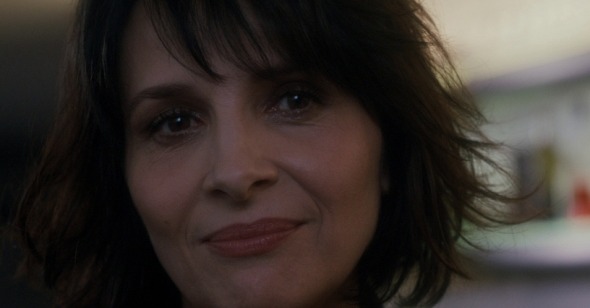In our 2015 symposium Reverse Shot Unauthorized, we asked our contributors to question the idea of auteurism. Specifically we challenged ourselves and our writers to rethink the use of that pesky little apostrophe that so often accompanies the name of the director before the title (Alain Resnais's Hiroshima mon amour—really, truly? Louis Malle's My Dinner with André—for sure?). The results included essays that granted potential authorship to writers, cinematographers, music composers, and, in a handful of cases, actors. One of these essays was Shonni Enelow's take on Juliette Binoche, whom she eloquently claimed was as much a creator of Clouds of Sils Maria as director Olivier Assayas. This particular piece of writing, plus the consistently challenging and varied career of this rarest of movie stars, provides a way of thinking about Binoche as auteur. This also brought about the realization that in our sixteen years of symposium topics, never once had we centered one around an actor. Our bias ends now.
From her breakthrough appearance in André Téchiné's 1985 Rendez-vous; to her emergence as an art-house darling in the late eighties and early nineties in such coolly "adult" films as The Unbearable Lightness of Being, Damage, and Blue; to her surprise Oscar win for The English Patient, which led to a period of middlebrow prestige dramas such as Chocolat; to her re-emergence as a formidable presence in daring world cinema from many of our greatest directors, including Assayas, Claire Denis, Hou Hsiao-hsien, and Kiarostami, Binoche has helped create a through-line in otherwise disparate works for generations of cinephiles. She has continually brought to her roles intense dedication, as well as a methodical approach to neuroses that can toggle between effortless and effortful; some can find her showmanship off-putting, while some of us are captivated in a purely pleasurable way.
Debates over Binoche's persona and craft seemed to culminate in last year's Let the Sunshine In, in which, working with Claire Denis, she created a character at once self-possessed and distraught, a "mess" who also seemed in control of her emotions—audiences were productively split between finding her lovable and maddening. Binoche often invites such ambiguity; but the passion, investment, and nuance she brings makes ambivalence impossible.
With this symposium, we wanted to hit as many of the Binoche hot spots as possible, though we know that, due to her quite extensive filmography, this could not be a complete career retrospective. We asked our contributors which films they'd like to write about and why, and then for them to ask what she brings to the film that makes her as much an author of the film's text as the director. Or conversely, perhaps, how does she not fully integrate into that text? How does her persona, if you think she has one, play out onscreen in a given film? Is there an innate star quality she has, like Meryl Streep, that gets inside all of her roles, or is she more chameleonic?
Some of the words and phrases our writers used to describe her performances in the resulting essays are "emotional generosity," "strained," "self-aware narcissism," "emancipated but cruel," "incandescent with irritation," "sincere emotion," and "self-conscious abstraction." In other words, there's a lot to unpack with Binoche, and as is the case with many of our finest actors, and certainly ones as widely admired and renowned as Binoche, perhaps we've taken her contributions for granted. We see her a lot, but perhaps we haven't looked closely enough.
Welcome to our new symposium, Binoche Auteur. Go to the articles.
